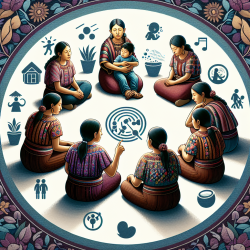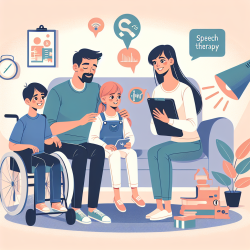Introduction
In the realm of speech-language pathology, data-driven decisions are paramount to creating effective therapeutic interventions. Recent research highlights the potential of culturally safe psychosocial interventions, such as Women's Circles, in improving maternal mental health and child development in Guatemalan indigenous communities. This blog delves into the outcomes of this study and explores how practitioners can leverage these findings to enhance their skills and improve outcomes for children.
Understanding Women's Circles
The study, "Women’s circles as a culturally safe psychosocial intervention in Guatemalan indigenous communities: a community-led pilot randomised trial," aimed to test the feasibility and impact of Women's Circles on maternal psychosocial distress and child development. Conducted in rural Mam and periurban K’iche’ communities, the intervention involved 10 sessions co-designed with local leaders. The sessions focused on enhancing wellbeing, self-efficacy, and engagement in early infant stimulation activities.
Key Findings
- Participants in the intervention group showed significant improvements in wellbeing and self-care self-efficacy compared to the control group.
- Women who attended more sessions demonstrated higher scores in wellbeing, self-care, infant-care self-efficacy, and early infant stimulation.
- The intervention was well-received, highlighting its cultural acceptability and feasibility in these communities.
Implications for Practitioners
For speech-language pathologists and other child development professionals, these findings underscore the importance of culturally tailored interventions. By incorporating elements of cultural safety and community involvement, practitioners can enhance the effectiveness of their programs. Here are some actionable insights:
- Embrace Cultural Context: Understand and integrate cultural practices and beliefs into therapeutic interventions to increase engagement and efficacy.
- Promote Community Involvement: Collaborate with community leaders to co-design interventions that resonate with local populations.
- Focus on Maternal Wellbeing: Addressing maternal mental health can have a cascading effect on child development, making it a critical component of early intervention programs.
Encouraging Further Research
While the pilot study provides promising results, further research is needed to explore the long-term impact of Women's Circles and similar interventions. Practitioners are encouraged to engage in research initiatives that examine the intersection of cultural practices and therapeutic outcomes. By doing so, they can contribute to a growing body of evidence that supports culturally informed practices in speech-language pathology.
Conclusion
The Women's Circles intervention in Guatemalan indigenous communities offers valuable insights into the role of cultural safety in psychosocial interventions. By embracing these findings, practitioners can enhance their skills and improve outcomes for children. To read the original research paper, please follow this link: Women’s circles as a culturally safe psychosocial intervention in Guatemalan indigenous communities: a community-led pilot randomised trial.










